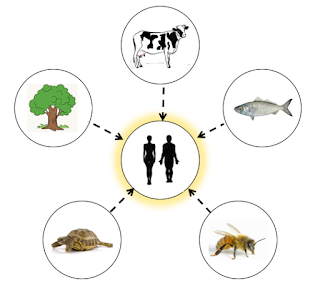What is ecolinguistics?
Each culture has its own unique view of nature, its own interpretation of what the world is made of. In the Comanche community in the United States, for example, there is a kinship link that connects humans to all that exists, to animals, plants and even to the very matter of which stars are made, since we all have a common origin.
In our industrial societies, in contrast, nature is understood mainly by its utility: for us nature is not quite nature but it is above all a set of "natural resources". Similarly, ecosystems are not quite ecosystems, but they are above all a set of “ecosystem services” that we benefit from.
What is nature? Is it our kin or is it a resource? Undoubtedly, the answers given to this question shape the ways in which nature is treated and how each society feels connected to it or tries to separate from it. Language plays a fundamental role in this, because it is through words that we will provide a specific answer to this question. In other words, it is through language that we will name the world in order to interact with it collectively. We agree on what is real through the words we collectively use.
For more than two decades now, a new field of study is emerging within the study of linguistics. For first timers, ecolinguistics might seem a concept difficult to understand: it is about language and it is also about ecology, two spheres of life that would otherwise seem quite independent from each other.
Ecolinguistics can be understood through several angles. Firstly, it is about understanding how the everyday discourses of Western culture (in media, politics, advertising, education, among others) shape the way we collectively think and treat the natural world: animals, plants and the land.
Ecolinguistic research has been able to show how certain discourse paradigms such as the economic growth paradigm lead to destroying the natural world, the very environment we depend upon for our livelihoods, through thinking it is merely an inert object to be exploited. This happens mainly because the discourse of economic theory is centered on concepts like 'individual utility', 'consumer', 'extraction', etc. that imply that humans are independent from their environment and establishes the idea that nature exists only to be exploited for human purposes (Stibbe 2015, Cáceres 2019a, 2019b)
This is also the case for advertisement discourses which constantly encourage consuming unnecessary and industrially produced commodities that rely on cost minimization, which leads them to pollute and mistreat the natural world, in ways such as plastic planetary pollution or tropical deforestation for intensive monocultures.
The main point of ecolinguistics is that in Western culture we collectively do the things we do because we explicitly or implicitly accept certain beliefs about the world: that we are somehow separate and superior from other living beings, that we are entitled to exploit other living beings and that the wellbeing of other living beings is not a matter of ethical concern. Other very entrenched beliefs include the idea that humans are the only beings that have a psyche or mind; the idea that reasoning is independent from emotion; the idea that human nature is self-interested, competitive and avaricious.
In this blog I discuss in detail a variety of topics concerning how Western culture speaks, thinks and treats the natural world, as well as how certain Indigenous cultures think, speak and treat the natural world in a radically different manner.
You can take a look at a list of all the articles we have written so far clicking this link.
References
Cáceres, R. (2019a). Cultiver une amitié avec la nature: ontologie, relation au monde et éducation à la permaculture. Access here
Cáceres, R. (2019b). La teoría económica y la destrucción de la naturaleza. Access here
Stibbe, A. (2015). Ecolinguistics: Language, ecology and the stories we live by. Routledge.





Comments
Post a Comment